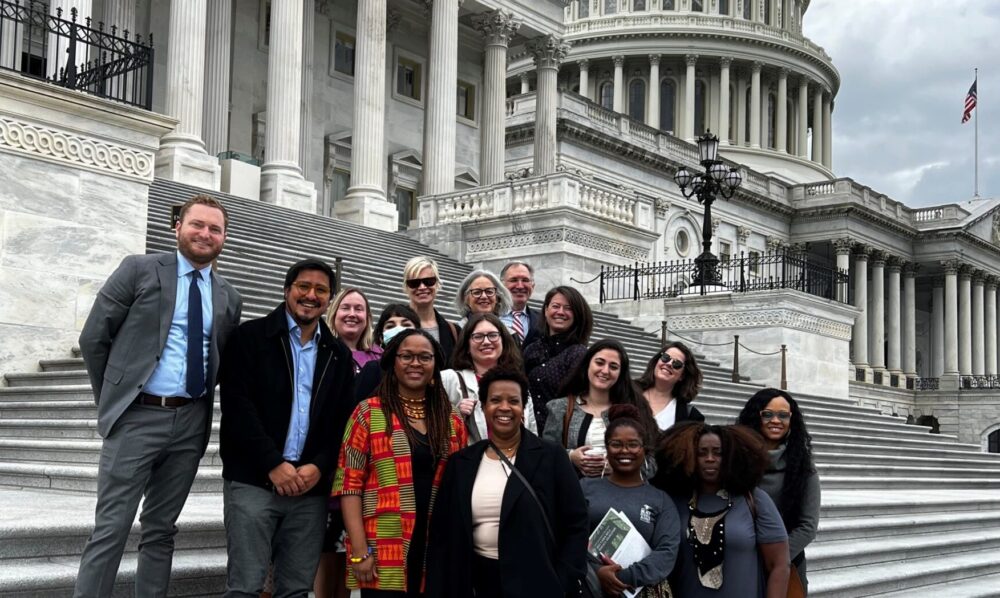After several years of virtual meetings due to COVID-19 pandemic restrictions, this May marked the return of the annual in-person conference for members of the Good Food For All (GFFA) coalition. It was also an opportunity for dozens of these grassroots and policy organizations from more than 20 states to take a side trip to Capitol Hill and advocate for a transformational food and farm bill—one that centers equity and racial justice to create a more healthy and sustainable food system by taking back control from the powerful corporations that have hijacked it.
GFFA members work together to transform our food system through collaborative planning, community engagement, and policy advocacy. The Union of Concerned Scientists helped to convene the annual GFFA meeting and to organize lobbying visits with key members of Congress who will soon be drafting the 2023 food and farm bill.
The morning of this “lobby day” kicked off with the first of four meetings on food security with the congressional leaders known as the Four Corners: the Senate and House Agriculture Committee chairs and ranking members who will lead the drafting of the food and farm bill over the next few months. GFFA members had an opportunity to speak with their agriculture policy staffs and share the priorities we want to see included in the bill.
Communicating policy priorities and personal stories
Our pitch to the offices of the Four Corners—Senate Agriculture Committee Chair Senator Debbie Stabenow (D-MI) and Ranking Member Senator John Boozman (R-AR), and House Agriculture Committee Chair G.T. Thompson (R-PA) and Ranking Member David Scott (D-GA)—focused on the following key messages:
The next food and farm bill should center equity and racial justice. The bill should address continuing systemic racial discrimination, including practices and unintended consequences within US Department of Agriculture (USDA) programming; support BIPOC (Black, Indigenous, and other people of color) farmers by improving their access to credit, and capital, as well as land tenure and access; and prioritize addressing the needs of BIPOC producers in all federal food and agriculture programs.
The next food and farm bill should focus strongly on climate. The bill should invest in research, technical assistance, and financial incentives that empower farmers and ranchers to reduce heat-trapping emissions and mitigate environmental harm. It should also implement farming practices and labor policies that require farms to adapt to extreme weather, and help accommodate farmworkers so they will be better able to withstand extreme weather.
The next food and farm bill should help support local and regional food systems. The bill should invest in community infrastructure and support for BIPOC-owned businesses, organizations, and cooperatives, and support programs that invest in and encourage procurement of locally grown and produced foods.
The next food and farm bill should support—and prevent any cuts to—key US nutrition programs. It’s crucial that the bill supports and protects the Supplemental Nutrition Assistance Program (SNAP), defending this key program from any potential funding cuts. It should also improve and expand other key programs such as the Gus Schumacher Nutrition Incentive Program (GusNIP), the Emergency Food Assistance Program (TEFAP), and others that are needed to meet current food security needs.
These meetings provided an opportunity for GFFA advocates—many of whom are farmers or work closely with local agriculture and food systems in their home states and districts—to share their own experiences with congressional offices. In addition to highlighting the coalition’s priorities, participants told personal stories about how these issues impact them on a day-to-day basis, giving policymakers a type of perspective that’s not always heard on Capitol Hill.
One example: several farmers who joined the meetings mentioned that they themselves rely on SNAP program funds to supplement their income and help feed their families, despite growing food for a living—a valuable and sobering insight as Congress considers the future of the SNAP program and its funding levels.
Meetings with elected officials can make a difference
The lobby day was a great opportunity to share GFFA’s views with Congress, but it’s just a start. As the food and farm bill drafting process continues, UCS hopes to facilitate more opportunities for GFFA members to meet with their own local members of Congress, in their home districts or virtually, to advocate for legislation that is strongly supportive of racial equity, a livable climate, local foods, and nutrition.
I’ve been involved in many lobby days over the years, on topics as diverse as funding for women’s health research, support for United Nations peacekeepers, and maintaining the United States’ leadership role in combating global hunger. Every time I join in a lobby day, I am always impressed with the passion, dedication, and expertise of the participants, who travel thousands of miles to share their stories and ensure that their voices, and those of their communities, are heard on Capitol Hill.
It was exciting to see so many advocates from around the country engaging with their elected representatives to help make the food and farm bill the strongest piece of legislation it can be. Thank you to all the GFFA members who participated—your voice truly made an impact!

